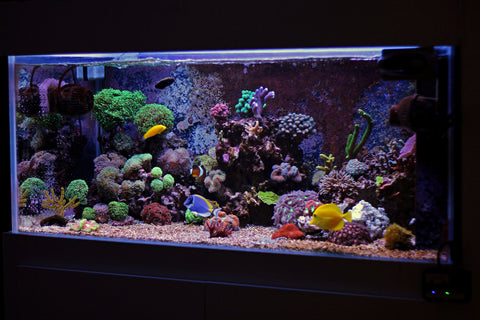Tips For Keeping & Caring For Nocturnal Reef Fish
Nocturnal fish are a fascinating addition to any aquarium!
These amazing creatures exhibit their bright colors and unique behaviors when the sun goes down.
Therefore, if you are considering incorporating nocturnal fish into your tank, you have to know what they want and offer them an appropriate environment for their well-being.
Caring For The Unique Needs Of Nocturnal Fish
Nocturnal fishes in the reef adapt themselves to darkness, causing changes in their behaviors, feeding patterns as well as habitat preferences. During the day, nocturnal fish are mostly inactive, unlike diurnal fish which are active at night seeking shelter during daylight hours. To recreate that natural environment replicate hiding spots or structures where your aquarium will rest and feel secure during the day. Put cave cracks and live rock formations so that these nocturnals may find a suitable retreat.
It is also important to create stable conditions for such fish by providing places where they can hide from predators. They are very sensitive to water parameters; therefore it is important to conduct regular tests and maintain good water quality at all times because this will help keep your fish vibrant as well as prevent some stress-related diseases.
Creating A Nocturnal-Friendly Aquarium
If you want to have healthy nocturnal reef fish then you should make sure that they are staying in a conducive environment.
Nocturnals need a lot of swimming space since these animals like exploring a lot more compared with numerous other types of pets now known. If possible ensure that your tank has a capacity of at least 30 gallons for hosting a few individuals of this kind.
Go with a fine-grained substrate such as sand which mimics the natural seabed. Nocturnals often sleep or hide under the sands hence use soft substrate to avoid injuries.
This being said, it’s important to provide hiding places for them too. Use live rock formations together with cave rocks and corals so that you can have an attractive and functional environment for your night fish. These structures will also help to maintain the water condition since some of them can act as biofilters.
Nocturnal reef fishes prefer a slow current in their native environment and hence require a powerhead or adjustment of the flow rate in your filtration system to provide a soothing state.
Choosing The Right Tank Mates For Nocturnal Reef Fish
When it comes to choosing tank mates for nocturnal fish, one must consider their compatibility and behavior. Avoid aggressive or territorial species that may harm or stress out your nocturnal fish. Opting for peaceful, non-aggressive species would be ideal as they will coexist harmoniously. Small wrasses, gobies, and blennies are some examples of suitable tankmates for such fish.
Also important is considering the sizes and activities of potential roommates. Therefore avoid larger aggressive animals which may compete with them for food or space as these nocturnals are generally smaller and peaceful.
Therefore, before introducing any of those into your aquarium always find out more about their requirements as well as behaviors so that you have a happy community.

Nutrition & Feeding Tips For Nocturnal Fish
It’s somehow hard feeding nocturnals since these creatures are mainly active at night. As such, providing food that caters to their nighttime nature can ensure that they receive all necessary nutrients during this time period. Here are some tips:
Feeding at Night: They prefer for the main meal to be given after switching off lights since this is the time when nocturnal fish are most active and more lively. It allows them to feed in a relaxed environment as well as simulate their actual feeding habits.
Specialized Diets: For instance, night fish may require certain types of food like meaty substances or live prey. To prevent your specific species from malnutrition, conduct a study about its dietary requirements and give it a diverse diet that contains frozen or live foods including brine shrimp, mysis shrimp, and small crustaceans.
Feed Stations: Since nocturnal fish prefer to eat during the night, it can be a difficult task to ensure that they get enough food in community tanks. Think of using feed stations or target feeding to ensure that your nocturnal fish are fed without competition from daytime tank mates.
Creating An Good Lighting Schedule For Nocturnal Fish
Lighting is crucial for the general welfare of your nocturnal reef fish. Unlike diurnal fish, they cannot tolerate bright lights and may get stressed or disoriented when exposed to intense illumination for long periods. Here are some factors you should consider while creating an appropriate lighting schedule:
Dimmed Lighting: Nocturnal fish thrive under low light levels. Use dim or moonlight or blue LED lighting to mimic their natural environment when it is daytime. This will offer them a sense of security and enable them to rest comfortably.
Nighttime Lighting: Consider acquiring special moonlight LED fixtures with a subtle glow at night. This allows you to watch your nocturnal fish’s actions without interfering with their natural rhythm.
Photoperiod: These creatures have a daily cycle of 12 hours light and 12 hours dark hence consistency must be maintained in photoperiods. Therefore, one should aim at a 12-hour light and 12-hour dark cycle which would imitate their natural day-night pattern of living; as such timers could be used so that there could be automation and consistency in the lighting program.

Keeping Water Quality For Nocturnal Reef Fish
Water quality is critical for all types of aquarium fishes including the nocturnal ones we are discussing; hence these delicate creatures are no exception. Nocturnals have highly sensitive responses towards water parameter shifts meaning regular maintenance routines are necessary when having such pets around your home grounds. Below are a few points regarding preserving good water qualities:
Regular Water Testing: Frequent analysis of ammonia, nitrite, nitrate, pH, and salinity levels in your aquarium should be done. Thus, maintain these chemical levels within the range corresponding to the species you have kept in your tank. Test kits can be found at pet stores or can be purchased online.
Water Changes: Change water frequently to eliminate built-up toxins and replenish trace elements. Depending on aquarium size and stocking density, aim for a 10% – 20% water change every two weeks or as required.
Filtration: Get yourself a reliable filtration system that matches the needs of your tank. Mechanical, biological, and chemical filters put together will keep the optimum quality of water in an aquarium. Ensure that filter media are cleaned as advised by the manufacturer.
Temperature and Salinity: Nocturnal reef fish cannot withstand temperature changes or salinity changes; hence they are sensitive to these factors. Use a reliable heater and thermometer to maintain a steady temperature range for your species. Keep an eye on salinity using a hydrometer or refractometer and adjust accordingly.

Common Challenges In Caring For Nocturnal Fish And How To Overcome Them
Caring for nocturnal fish can have some difficulties. Here are some challenges that you may face and solutions to them:
Timidity & Concealment
Nocturnal fish tend to be shy and may spend most of their time hiding. Provide plenty of hideouts and structures in your tank to make them feel secure. Eventually, as they become familiar with the new environment, they may start coming out of hiding.
Feeding Dominance
In a community containing both diurnal and nocturnal species, it is possible that the day-active ones will dominate night-active ones when it comes to feeding. To ensure your night-active species get their share, you may employ feeding stations or target feeding This helps to provide specific food right into your night-active species while other fishes in the tank do not interfere.
Stress and Disease
Improperly adjusted surroundings can lead to stress-related fish diseases and illnesses among nocturnal reef fish species. Monitor water quality, stabilize conditions, and feed them properly to enhance their disease-resistance capability. Keep new fish under quarantine before introducing them into the main aquarium so as not to spread diseases among fish.
Nocturnal Reef Fish For Aquarium Hobbyists
The selection of the right kind of nocturnal reef fish is critical for proper care. Below are some of our favorite nocturnal marine species:
- Marine eels

- Squirrelfish

- Soldierfish

- Scorpionfish

- Pineconefish

- Cardinalfish

Remember to always research the specific care requirements of each species before adding them to your aquarium.
Conclusion
Taking care of a reef nocturnal fish is very rewarding.
By knowing what they exactly need, making an appropriate setup for an aquarium, finding correct tank mates for them, maintaining an adequate feeding regime including light schedules, and keeping optimal water hygiene levels, you can create a healthy environment for these incredible creatures.



